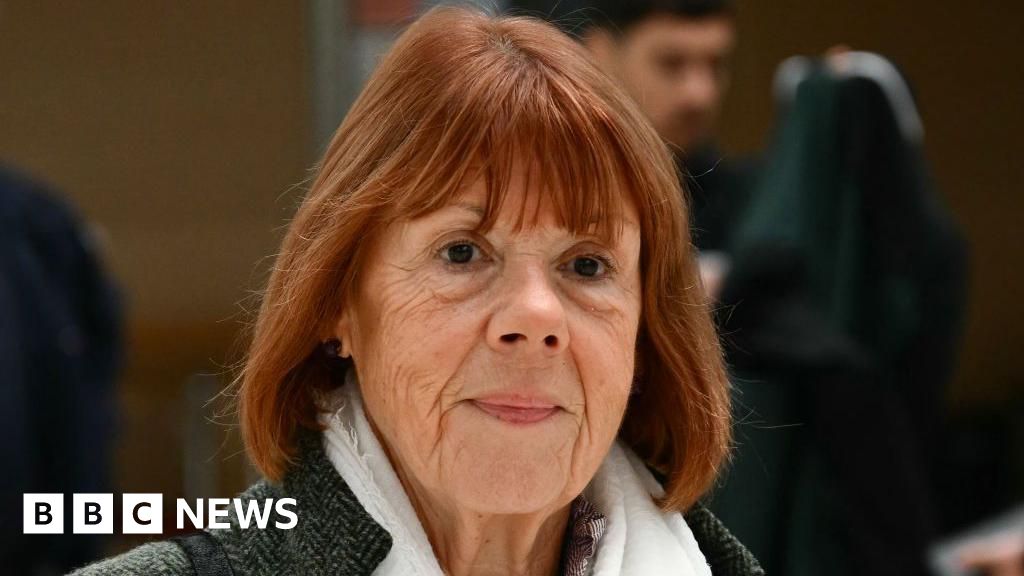An abrupt silence swamped the courtroom in Avignon as three large television screens, positioned high on three walls, flickered back to life. One could sense people bracing themselves.
In a bleak trial about extraordinary allegations of drugs and rape, it was time to show more of Dominique Pelicot’s carefully curated home videos.
Those videos, filmed by Pelicot and kept on a hard drive that he labelled “abuse”, document assaults on his ex-wife, Gisèle, over the course of a decade.
Fifty men are accused of raping her after she was drugged and left unconscious in the couple’s bed by her husband.
Now 72, Gisèle Pelicot has waived her anonymity so the full details of what she was subjected to can be revealed to the French public. Her lawyers fought to have videos of the crimes screened in court.
Although the judge had earlier said people “of a sensitive disposition” would be able to leave, one of Gisèle Pelicot’s legal team said many had decided to “look the rape straight in the eye”.
Many of the men recruited by her ex-husband on the internet insist they did not believe what they were doing was rape.
Dominique Pelicot sat behind a glass panel, slumped in his chair. His grey hair neatly cut, his left hand raised to block his view of the screen.
Gisèle Pelicot sat on the opposite side of the court, her head against the wall, her eyes occasionally closed. A blank, unreadable expression on her face.
On the screen, in near silence, a short, pale man wearing only blue underpants and black socks, could be seen approaching a bed.
The camera wobbled as it followed him. Behind the man, a woman lay on her left side, almost naked, on a crumpled white sheet. And then, without edits, without any blurring, the sex acts began.
At times, later in the video, you could clearly hear the woman snoring.
In court, Dominique Pelicot appeared to place both hands over his ears. For years he had laced his wife’s food and drink with an anti-anxiety drug, which made her unconscious and seriously affected her health.
This and other videos, shown in court and on Gisèle Pelicot’s insistence to the public watching from an overflow room near by, lie at the heart of the prosecution’s case.
Prosecutors argue that all 50 men who accepted online invitations from Pelicot to visit the family home in the village of Mazan, near Avignon, must have known his wife was unconscious.
Therefore, they must have realised that she was not a consenting partner in some kind of sex game in which she merely pretended to be asleep. Therefore, they must have intended to rape her.
But a string of defence lawyers and their clients have now sought to challenge that.
The man visible on screen in this particular video was a 43-year-old carpenter, named in court as Vincent C.
He stood now in front of the judges in a separate glass-walled area at the rear of the courtroom, with his head bowed down, looking away from the screen.
“Do you recognise the facts of aggravated rape that you are accused of?” asked lead judge Roger Arata – an affable figure with a large white moustache.
“No,” Vincent C replied.
His explanation, delivered haltingly, amounted to a hazy assumption that, since Dominique Pelicot had told him his wife was a consenting partner in a sex game, he had not given the matter any more thought.
At this point Gisèle Pelicot left the courtroom for a few minutes, saying “I can’t bear that man”.
Vincent C acknowledged the experience was “weird,” and unlike anything he had encountered with other couples. And yet, he went on, “I didn’t say to myself: this isn’t going well… I don’t think [about much else] in those moments.”
However, having spoken to his mother and to lawyers, and watching the trial unfold, Vincent C said he had come to understand more about French law, the meaning of rape and the gravity of his actions.
“Now that I am being told how the events unfolded, yes, the acts I committed would amount to rape.”
“Are you aware that Gisèle Pelicot was a victim of your acts?” asked the judge.
“Yes.”
Pelicot has himself admitted all the charges against him.
Outside the courtroom, a lawyer representing another of the accused men distinguished between Pelicot and the others.
“Today it’s clear that Dominique Pelicot’s position is to try to dilute his responsibility by dragging down 50 other men. [Gisèle] is the victim. The question is whether the others were complicit in it or were tricked into participating,” said Paul-Roger Gontard.
While some of the accused have admitted to rape, others have claimed to have spoken or interacted with Gisèle Pelicot in the bedroom.
“So, there are grey zones in this trial,” Mr Gontard continued, pointing to the fact that the videos themselves had already been edited by Pelicot himself, meaning that evidence potentially helpful for the defence could have been cut out.
“He selected what he wanted to keep. He selected the shots. But don’t let that fool you. Everyone says he’s very manipulative.
“Many [of the accused] thought it was a libertine project with the couple, only to discover it was actually a sinister and criminal scheme devised by the husband.
“The question today is when did they realise something was wrong? This realisation varies among [the accused]. The question often arises – why didn’t they leave? It’s not that simple to leave at that moment when faced with a clearly dominant personality in a situation where they are naked and recorded by a camera,” the lawyer added.
Ten minutes’ drive from the courthouse, in a small house in a suburb of Avignon, another of the accused, who has already testified in the trial, agreed to speak to the BBC on condition of anonymity. The man, a nurse by profession, portrayed himself as a victim of Dominique Pelicot.
“I was terrified… I was reduced to the state of an instrument. He was the one who told me: ‘do this.’ I said to myself, this man is not normal, he is a psychopath. It is an ambush, a trap. He is going to kill me in this house,” said the accused man.
He also claimed that Gisèle Pelicot had “reacted to simple caresses… she scratches herself with a co-ordinated movement”, which he said led him to believe that she was conscious and merely pretending to sleep.
When I challenged him, suggesting he was simply seeking to present himself as a victim to avoid culpability, he insisted that was not the case.
He lashed out, repeatedly, at the way the trial was being conducted, at alleged “pseudo-feminists”, and the “hysteria” the media had generated.
Speaking forcefully, but occasionally sobbing, he maintained he was not a rapist. However, he acknowledged that “I will never be considered innocent in this case. I will always carry my guilt with me. I know that.”
The trial in Avignon is set to continue for many more weeks, with a verdict due shortly before Christmas.
Only half of the accused have so far been called to testify, but already this case has revealed, in the grimiest detail, the horrors to which Gisèle Pelicot was subjected, and her extraordinary courage in declining her right to privacy.
The case has also highlighted longstanding debates about French laws and attitudes surrounding rape, and the extent to which a woman’s consent is, or should be considered, a factor in court.
Many of the men have admitted wrongdoing and, like Vincent C, even apologised to Gisèle Pelicot in the courtroom, but they have also insisted that since they didn’t intend to rape, they should not be found guilty of it. – BBC
By Andrew Harding








